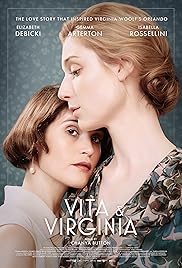VITA & VIRGINIA
(director/writer: Chanya Button; screenwriters: based on the script and play by Eileen Atkins/letters of Virginia Woolf: cinematographer: Carlos De Carvalho; editor: Mark Trend; music: Isobel Waller-Bridge; cast: Gemma Arterton (Vita Sackville-West), Elizabeth Debicki (Virginia Woolf), Isabella Rossellini (Lady Sackville), Rupert Penry-Jones (Harold Nicolson), Peter Ferdinando (Leonard Woolf), Julian Bell (Brenock O’Connor), Clive Bell (Gethin Anthony), Angelica Bell (Amelie Metcalfe), Darren Dixon (Ben Sackville-West), Sam Hardy (Nigel Sackville-West); Runtime: 110; MPAA Rating: NR; producers: Katie Holly, Evangelo Kioussis; IFCFilms: 2018-Ireland/UK)
“The engaging true story of a lesbian love affair from two noted English writers of the 20th century.”
Reviewed by Dennis Schwartz
Chanya Button (“Burn Burn Burn”) is the writer-director of this mostly superficial but diverting literary drama, one that’s based on the 1992 play by Eileen Atkins (who also serves as co-writer). It tells the engaging true story of a lesbian love affair from two noted English writers of the 20th century. Their affair was over 10-year period. What the film barely touches, is Virginia’s mental illness which led to her suicide at age 59.
In the bohemian high society in the England of the 1920s, Vita Sackville-West (Gemma Arterton) and Virginia Woolf (Elizabeth Debicki) are free spirits who connect with each other. Vita is the daring writer society wife of a diplomat, who is not constrained from having affairs with other women by her marriage. Virginia Woolf is the brilliant, eccentric and famed but troubled novelist she romantically hooks up with. The narrative is built around their intense relationship.
The film is delightful when the two spirited ladies are intimate and openly reveal themselves to each other (their good points and warts). The loner but moderately successful writer, at the time, the brilliant Virginia, lives in the dodgy artistic Bloomsbury section of London, and lives only for her writing. While the unconventional Vita is a strong-willed author, who lives mostly for sex and pleasure. How the depressed Virginia succumbs to Vita and how this profound relationship influences her to write her great novel, become the focus of the narrative. There’s enough Virginia Woolf in it for me to give it a warm recommendation as a curious watch, even if it drags when it gets stuck in trying to go with its belabored familiar period trappings. But that stupendous performance by Debicki is what makes the film top out, along with the pleasing photography by Carlos De Carvalho and the catchy electro score from Isobel Waller-Bridge.

REVIEWED ON 7/4/2019 GRADE: B